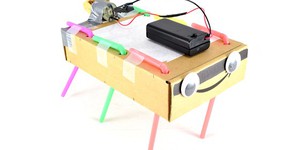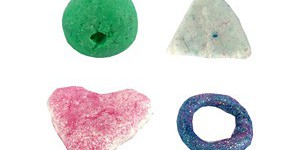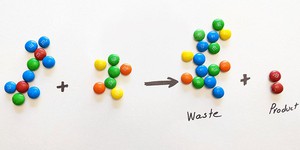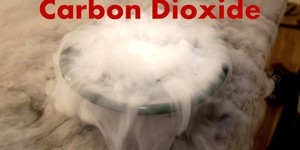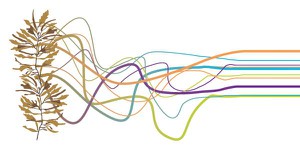Middle School, Chemistry Lesson Plans (7 results)
An experienced chemistry professor used to say that it took about one explosion per week to maintain college students' attention in chemistry lectures. At that rate, we'd get in pretty big trouble with a lot of parents and teachers! Don't worry, we still have lots of bubbles, fizzes, bangs, and color changes for you to explore.
|
Select a resource
Sort by
|
Video Lesson
Grade: 6th-8th
8 reviews
Chemical reactions can result in interesting products! In this lesson, students learn how plastics are made by conducting a polymerization reaction in a simple milk-to-plastic transforming experiment. During their experiments, students will be able to compare the physical properties of their reactants (milk and vinegar) and their resulting organic casein polymer.
Read more
NGSS Performance Expectations:
Featured
Lesson Plan
Grade: 6th-8th
7 reviews
Junkbots are easy-to-build robots that you can make using a simple circuit and some recyclable materials. In this lesson, your students will learn about engineering design as they compete to build the fastest robot. No previous robotics experience is required!
Read more
NGSS Performance Expectations:
Lesson Plan
Grade: 6th-8th
27 reviews
Teach your students how to make plastic out of milk in this hands-on lesson plan! You will conduct a simple milk-transforming experiment to explore how plastics can be derived from a natural resource such as milk. Students will perform their own experiments and can even create a product from their resulting organic casein polymer.
Read more
NGSS Performance Expectations:
Lesson Plan
Grade: 6th-8th
How do "instant" cold packs get cold when they are stored at room temperature, unlike a regular ice pack which must be stored in the freezer? In this lesson plan, students will explore several endothermic and exothermic reactions, and use their observations to choose the chemical reaction that best fits the design constraints for their own chemical cold pack.
Read more
NGSS Performance Expectations:
Lesson Plan
Grade: 6th-12th
2 reviews
In this lesson, students will do a simple exercise with M&Ms to understand what environmental impact factor (E-factor) is, how it applies to chemical processes, and how waste from chemical reactions can be reduced by applying the principles of green chemistry.
Learning Objectives
Students will:
Understand strategies for reducing waste
Perform an exercise which has them practice E-factor
Relate the exercise to chemical processes
NGSS Alignment
MS-PS1-3.
Gather and make…
Read more
Lesson Plan
Grade: 5th-12th
2 reviews
Where does CO₂ come from and how does excess carbon dioxide in the atmosphere affect the ocean and aquatic life? In this lesson students are introduced to the carbon cycle and explore pH and acidification with hands-on experiments. They then connect their experimental data with real-world data to evaluate claims about carbon dioxide and ocean acidification. Finally, students are introduced to how different companies and research groups are using green chemistry to build carbon capture…
Read more
New
Lesson Plan
Grade: 6th-12th
Create a two-part system for filtering greywater. Teams will focus on communication and systems engineering as they build separate components to filter solid and liquid waste and then combine them into one device.
Learning Objectives
Students will:
Consider the potential effects of drought and how greywater could be part of the solution.
Design a system for filtering out solid waste or liquid waste.
Consider effective communication strategies with their team.
Collaborate on their design…
Read more
Lesson Plan
Grade: 6th-8th
1 review
These lessons use open-ended exploration to introduce students to biopolymers and the chemistry behind cross-linking. Students will draw inspiration from biology and use authentic scientific practices to design and create colorful string creations from a natural polymer, alginate.
Learning Objectives
Students will:
Engage in authentic science practices through open-ended exploration.
Create a string using polymers harvested from living algae.
Manipulate the properties of a…
Read more
Lesson Plan
Grade: 6th-8th
Look around and you will see fabrics everywhere, from clothes to upholstery, in a wide range of colors. In this chemistry lab students will dye strips of fabrics to explore how variables like pH and fiber type influence fabric colors. Students will also look at the life cycles of natural and synthetic fibers and apply green chemistry principles to understand how science can help make advances towards a "greener" textile industry.
Learning Objectives
Students will:
Understand that synthetic…
Read more
|
Explore Our Science Videos
Gear Ratio for the Junior Solar Sprint
Volleyball Machine: 2019 Engineering Challenge
How To Curl Metals With Heat





